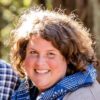
My grandmother was a master at crossword puzzles with a quick wit and an easy laugh. She was also a refugee. While that inadequate title never defined her and I don’t recall Nana ever describing herself as a refugee, circumstances she faced as a young child shaped the rest of her life and the legacy she left with her children and grandchildren.
Nana was born in a Lutheran village in Saratov, Russia. Her family were ethnic Germans who had settled farming land in the Volga region of Russia at the invitation of Catherine the Great. The Volga Germans lived and cultivated the land peacefully for generations until the Russian Revolution when the government revoked many of their rights. During a famine, the government seized food from the Volga Germans causing many to die of starvation. Under these conditions in 1921, my 18-month-old grandmother and her parents fled the country.
My great grandfather paid a million rubles for false passports. While trying to flee, their train broke down and Nana’s father carried her across the border into Poland where the young family was captured and incarcerated. After some months in dire conditions, a German farmer and his church helped them get out of detention and into the Frankfurt area of Germany. In Frankfurt, my great grandfather worked, put together immigration papers, and found sponsorship in the U.S.
Nana was just three years old when she remembers coming through Ellis Island. There was a problem with her eye and, at first, they wouldn’t let her pass. A nursing mother squirted milk on it and the situation was resolved. Nana remembers how the train cars bumped together as they entered stations on the journey to Kansas where her family would build a new life.
I know those early impressions of being a stranger in a new land never left Nana. Even at the end of her life, Nana loved to tell me how she was chosen by her first grade teacher to help all of the other children in the class. She spoke no English when she entered that classroom and she was determined to work hard and succeed in this country. She passed these values on to her children and grandchildren and was always a proud cheerleader of my academic accomplishments.
For this reason, I’ve never been able to see the current refugee situation through a detached, geopolitical lens. What the media presents to us as a global crisis is actually the cumulative effect of millions of individual family stories, like my grandmother’s. The nationalities and ethnicities change, but many elements of the stories remain the same.
Last October, I had the opportunity to travel with TSOS to Frankfurt to help with a new round of refugee interviews. As the plane landed, it was not lost on me that this trip took me to the very soil where my own family sought and obtained refuge nearly a century ago.
However, there is one pointed difference between my grandmother’s narrative and the stories from people TSOS has interviewed in the last two years. For my grandmother, once her family reached Germany, there was a clear path forward for them to begin a new life. For many of the people TSOS has interviewed, there is no clear path forward in Europe or the U.S. They are in a holding pattern. They cannot move backwards and they are not allowed to move forward in their lives due to unwelcoming policies.
In today’s refugee children, I see my grandmother. I see in their eyes the rich legacies of hard work and achievement that they will pass on to their families and communities, if they are given a chance to do so. At this moment, they need us. And we need them.

